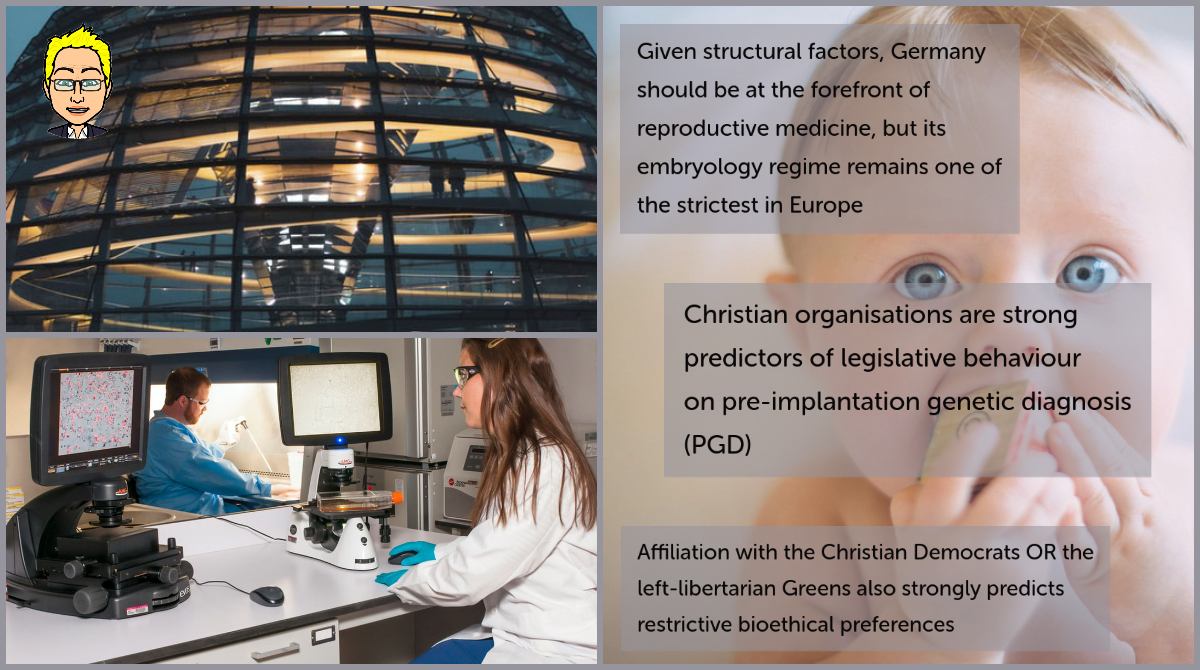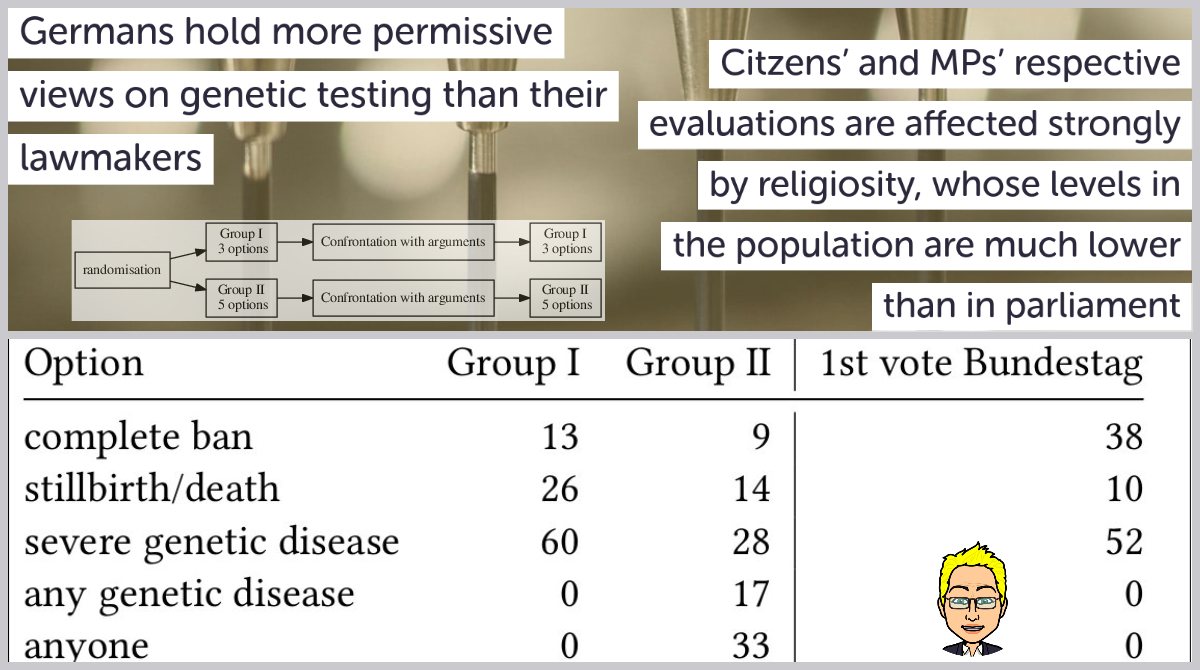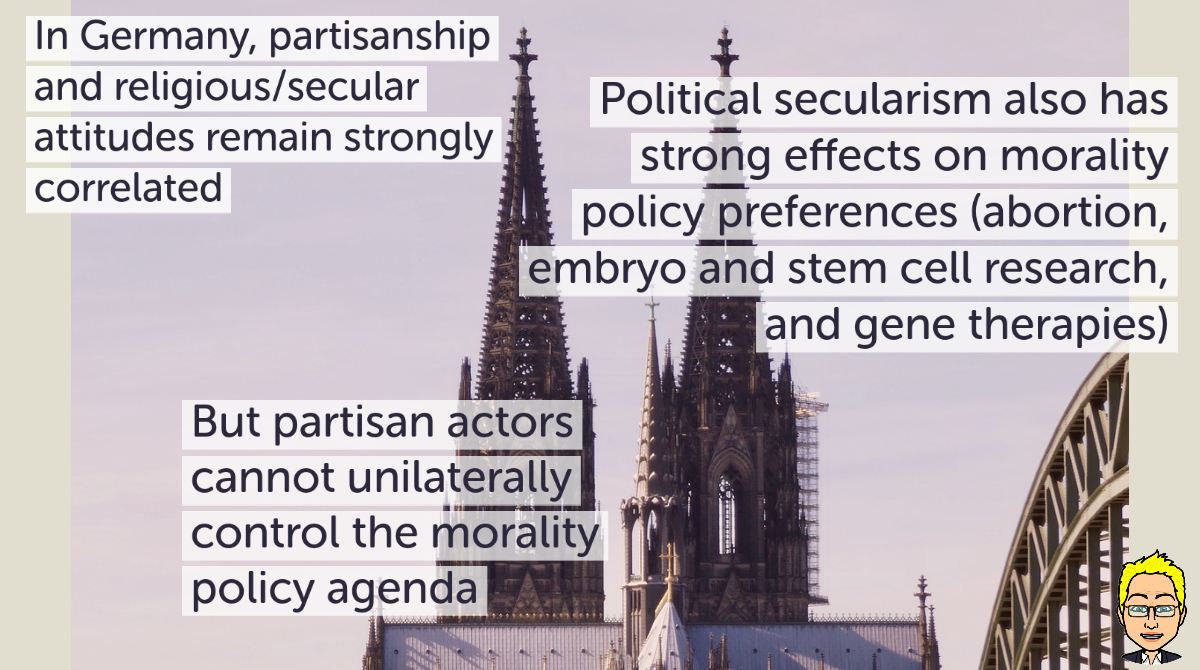Zu meinen Forschungsinteressen gehören auch die Einstellungen zu bioethischen Fragen. Diese fallen in die (sehr viel größeren) Gruppe der Moral-Politiken: Politische Fragen, die mit fundamentalen Konflikten und Werten verbunden sind.
Die parlamentarische Entscheidung zur PID
Mein Interesse an diesem Feld geht auf ein Puzzle zurück: nur unter großem juristischen Druck hat der Bundetag das absolute Verbot der Präimplantationsdiagnostik (PID) gelockert. PID ist eine Sammelbezeichnung für Verfahren, mit denen im Rahmen der künstlichen Befruchtung (IVF) gesunde Embryonen für die Einpflanzung ausgewählt werden können. Die neuen Regelungen sind immer noch recht restriktiv und konnten trotzdem nur von einer knappen (parteiübergreifenden) Mehrheit durchgesetzt werden. Im Gegensatz dazu scheinen die neuen Gesetze in der Öffentlichkeit viel Zustimmung zu finden. Eine Analyse der Abgeordneten und ihres Wahlverhaltens zeigt, dass eine erstaunlich große Zahl von ihnen Beziehungen zu religiösen Gruppierungen und Institutionen unterhält. Solche Mitgliedschaften sind ein hervorragender Prädiktor für eine “Nein”-Stimme. Darüber hinaus ist die Parteimitgliedschaft aussagekräftig: Ceteris paribus stimmten Abgeordnete von CDU und Grünen signifikant häufiger gegen die neuen Gesetze. Die vollständigen Ergebnisse sind als open access Artikel in Research & Politics erschienen. . Replikationsdaten sind frei verfügbar.
- Arzheimer, Kai. “Strange Bedfellows: The Bundestag’s Free Vote on Pre-Implantation Genetic Diagnosis (PGD) Reveals How Germany’s Restrictive Bioethics Legislation is Shaped by a Christian Democratic/New Left Issue-Coalition.” Research and Politics 2.3 (2015): 1–7. doi:10.1177/2053168015601130
[BibTeX] [Download PDF] [HTML] [DATA]@Article{arzheimer-2015d, author = {Arzheimer, Kai}, title = {Strange Bedfellows: The Bundestag's Free Vote on Pre-Implantation Genetic Diagnosis (PGD) Reveals How Germany's Restrictive Bioethics Legislation is Shaped by a Christian Democratic/New Left Issue-Coalition}, journal = {Research and Politics}, year = 2015, doi = {10.1177/2053168015601130}, html = {https://rap.sagepub.com/content/2/3/2053168015601130}, url = {https://rap.sagepub.com/content/2/3/2053168015601130.full.pdf}, data = {https://hdl.handle.net/10.7910/DVN/KG38OG}, pages = {1--7}, number = {3}, volume = {2} }
Citizens’s Views on Genetic Testing (PGD)
Nach dieser Studie wollte ich mehr darüber wissen, was normale Bürgerinnen und Bürger über bioethische Fragen denken. Deshalb habe ich (mit großzügiger Unterstützung durch die DFG) eine bevölkerungsrepräsentative Umfrage zu diesem Thema durchgeführt. Herzstück der Studie ist ein Umfrageexperiment: rund 1000 Befragte konnten zwischen den drei im Parlament diskutierten Gesetzesentwürfen wählen, etwa 1000 weitere Befragten wurden zusätzliche Optionen angeboten, die in etwa der Situation in Belgien und Großbritannien entsprechen. Im Anschluss wurden die Teilnehmerinnen und Teilnehmer mit 16 Pro- und Contra-Argumenten aus der Bundestagsdebatte konfrontiert und anschließend noch einmal um ihr Votum gebeten.
Im Ergebnis zeigt sich, dass die Bürgerinnen und Bürger sehr viel liberaler eingestellt sind als die Abgeordneten. Die Konfrontation mit den Argumenten ändert daran nichts. Pro-Argumente wurden weithin akzeptiert, Contra-Argumente mehrheitlich abgelehnt. Ursache dafür ist, dass religiöse Bindungen in der Bevölkerung weit seltener sind als im Parlament. Dafür sind säkulare Orientierungen weitverbreitet. Dies hat Konsequenzen, die weit über das Thema PID hinausgehen. Der Artikel, in dem all dies ausführlich dargestellt wird, erscheint als open access Publikation in Political Research Exchange. Replikationsdaten sind frei verfügbar.
- Arzheimer, Kai. “Secular Citizens, Pious MPs: Why German Attitudes About Genetic Testing Are Much More Permissive Than German Laws.” Political Research Exchange 2.1 (2020). doi:10.1080/2474736X.2020.1765693
[BibTeX] [Abstract] [Download PDF] [HTML] [DATA]Germany has lifted its total ban on Preimplantation Genetic Diagnosis (PGD, a form of genetic testing), but the new rules are still much stricter than those in other European countries. Results from a large-scale survey experiment show that the general population holds more permissive views on this bio-ethical question than lawmakers. In a country seen as a paradigm for the “religious world” of morality politics, many citizens even support further liberalisation along the lines of legislation in Belgium and the UK. Induced reflection on the arguments raised in parliament does not change this: arguments in favour of PGD are widely accepted by respondents, whereas many citizens reject the arguments against PGD. Citzens’ and MPs’ respective evaluations are affected strongly by religiosity, whose levels in the population are much lower than in parliament. Widespread secular views are not adequately represented in politics. This does not only concern the regulation of PGD but also other current and future bioethical issues. It is unlikely that this tension can be resolved through electoral politics. These findings have important ramifications not just for practical morality politics in Germany and other “religious world” countries but also for the two worlds framework itself.
@Article{arzheimer-2020b, author = {Arzheimer, Kai}, title = {Secular Citizens, Pious MPs: Why German Attitudes About Genetic Testing Are Much More Permissive Than German Laws}, html = {https://www.tandfonline.com/doi/full/10.1080/2474736X.2020.1765693}, journal = {Political Research Exchange}, url = {https://www.tandfonline.com/doi/pdf/10.1080/2474736X.2020.1765693?needAccess=true}, year = 2020, volume = {2}, number = {1}, abstract = {Germany has lifted its total ban on Preimplantation Genetic Diagnosis (PGD, a form of genetic testing), but the new rules are still much stricter than those in other European countries. Results from a large-scale survey experiment show that the general population holds more permissive views on this bio-ethical question than lawmakers. In a country seen as a paradigm for the "religious world" of morality politics, many citizens even support further liberalisation along the lines of legislation in Belgium and the UK. Induced reflection on the arguments raised in parliament does not change this: arguments in favour of PGD are widely accepted by respondents, whereas many citizens reject the arguments against PGD. Citzens' and MPs' respective evaluations are affected strongly by religiosity, whose levels in the population are much lower than in parliament. Widespread secular views are not adequately represented in politics. This does not only concern the regulation of PGD but also other current and future bioethical issues. It is unlikely that this tension can be resolved through electoral politics. These findings have important ramifications not just for practical morality politics in Germany and other "religious world" countries but also for the two worlds framework itself.}, html = {https://www.tandfonline.com/doi/full/10.1080/2474736X.2020.1765693}, url = {https://www.tandfonline.com/doi/pdf/10.1080/2474736X.2020.1765693?needAccess=true}, data = {https://doi.org/10.7910/DVN/PY9TBQ}, doi = {10.1080/2474736X.2020.1765693}, dateadded = {28-03-2020} }
A micro-level test of the two-worlds theory
Die “two-worlds”-Theorie von Engeli, Green-Pedersen & Larsen ist der wichtigste komparative Ansatz zur Erklärung von Moral-Politik. Da es sich im Kern um eine Cleavage-Theorie handelt, betrachtet der Ansatz vor allem die Makro- und Meso-Ebene, macht aber (implizite) Annahmen über die Mikro-Ebene. In einem kurzen Artikel formuliere ich diese Annahmen aus und teste sie mithilfe von Strukturgleichungsmodellen. Die Befunde sind mit der “two-worlds”-Theorie kompatibel, werfen aber einige neue Fragen auf. Die vollständigen Ergebnisse erscheinen in Research & Politics. Replikationsdaten sind frei verfügbar.
- Arzheimer, Kai. “A partial micro-foundation for the ‘two-worlds’ theory of morality policymaking: Evidence from Germany.” Research & Politics 7.2 (2020). doi:10.1177/2053168020917823
[BibTeX] [Abstract] [Download PDF] [HTML] [DATA]The two-worlds framework is currently the most important account of morality policymaking in Europe. For this theory of elite behaviour to be valid, a number of implicit assumptions about political belief systems at the mass level must hold. This contribution spells out these assumptions and tests them within a structural equation modelling framework, using original survey data from Germany, a country that constitutes a crucial case for the two-worlds theory. The results showed that the implicit individual-level preconditions of the two-worlds framework were fulfilled. Political secularism and partisanship were strongly associated. Political secularism also had strong effects on morality policy preferences regarding the preferred regulation of abortion, embryo and stem cell research, and gene therapies, even when controlling for a host of background variables. However, the size of the effects did not vary across politicised and non-politicised issues. This casts some doubt over the ability of partisan actors to unilaterally control the morality policy agenda.
@Article{arzheimer-2020c, author = {Kai Arzheimer}, title = {A partial micro-foundation for the 'two-worlds' theory of morality policymaking: Evidence from Germany}, journal = {Research \& Politics}, year = 2020, volume = 7, number = 2, abstract = {The two-worlds framework is currently the most important account of morality policymaking in Europe. For this theory of elite behaviour to be valid, a number of implicit assumptions about political belief systems at the mass level must hold. This contribution spells out these assumptions and tests them within a structural equation modelling framework, using original survey data from Germany, a country that constitutes a crucial case for the two-worlds theory. The results showed that the implicit individual-level preconditions of the two-worlds framework were fulfilled. Political secularism and partisanship were strongly associated. Political secularism also had strong effects on morality policy preferences regarding the preferred regulation of abortion, embryo and stem cell research, and gene therapies, even when controlling for a host of background variables. However, the size of the effects did not vary across politicised and non-politicised issues. This casts some doubt over the ability of partisan actors to unilaterally control the morality policy agenda.}, dateadded = {28-03-2020}, url = {https://journals.sagepub.com/doi/pdf/10.1177/2053168020917823}, data = {https://doi.org/10.7910/DVN/2MIWPN}, html = {https://journals.sagepub.com/doi/10.1177/2053168020917823}, keywords = {bioethik}, doi = {10.1177/2053168020917823} }
A Short Scale for Measuring Political Secularism
Politischer Säkularismus ist ein neues Konzept, das in den Artikeln oben eine wichtige Rolle spielt. Aber wie soll man politischen Säkularismus messen? In dieser kurzen Research Note stelle ich das Konzept und fünf Items zu seiner Messung vor. Im Anschluss zeige ich, dass diese Items eine Skala bilden, die formalen Ansprüchen an Validität und Reliabilität genügt.
- Arzheimer, Kai. “A short scale for measuring political secularism.” Politics and Religion 15.4 (2022): 827-840. doi:10.1017/S1755048322000104
[BibTeX] [Abstract] [Download PDF] [HTML] [DATA]As religiousness is declining across democracies, scientific interest in secular orientations and their political implications is growing. One specific and particularly important aspect of secular attitudes is political secularism. Political secularism is not merely the absence of religiousness, but rather a world view which holds that religious beliefs should play no role in politics. While there are hundreds of survey instruments that measure the strength and content of religiousness, there is no comparable measure that taps into political secularism. In this research note, I briefly review the concept of political secularism and present a cluster of items which target it. Utilising data from four large population representative samples taken in the eastern and western states of Germany, I use Confirmatory Factor Analysis to show that these items form a short but internally consistent scale. This scale also displays convergent and discriminant validity. It may be readily used in future surveys.
@Article{arzheimer-2022, author = {Arzheimer, Kai}, title = {A short scale for measuring political secularism}, journal = {Politics and Religion}, year = 2022, volume = {15}, number = {4}, pages = {827-840}, abstract = {As religiousness is declining across democracies, scientific interest in secular orientations and their political implications is growing. One specific and particularly important aspect of secular attitudes is political secularism. Political secularism is not merely the absence of religiousness, but rather a world view which holds that religious beliefs should play no role in politics. While there are hundreds of survey instruments that measure the strength and content of religiousness, there is no comparable measure that taps into political secularism. In this research note, I briefly review the concept of political secularism and present a cluster of items which target it. Utilising data from four large population representative samples taken in the eastern and western states of Germany, I use Confirmatory Factor Analysis to show that these items form a short but internally consistent scale. This scale also displays convergent and discriminant validity. It may be readily used in future surveys.}, dateadded = {22-12-2021}, doi = {10.1017/S1755048322000104}, url = {https://www.cambridge.org/core/services/aop-cambridge-core/content/view/21DBFFEAB1631615697BBC3CC5FD5128/S1755048322000104a.pdf/a-short-scale-for-measuring-political-secularism.pdf}, data = {https://doi.org/10.7910/DVN/XEKNYW}, html = {https://www.kai-arzheimer.com/scale-political-secularism}, }
The links between basic human values and Political Secularism
In diesem Artikel geht es um die Wurzeln des Politischen Säkularismus und insbesondere um die Bedeutung von Grundwerten (basic human values oder Schwartz values). Aufgrund theoretischer Überlegungen sollten vor allem zwei dieser Werte einen Effekt auf Politischen Säkularismus haben: self-drection sollte mit höheren und tradition mit niedrigeren Säkularismus-Werten verbunden sein. Dies lässt sich empirisch bestätigen: Beide Effekte lassen sich selbst dann nachweisen, wenn für Religiosität kontrolliert wird, die ihrerseits einen Einfluss auf Säkularismus hat und mit den Schwartz-Werten korreliert.
- Arzheimer, Kai. “The Links between Basic Human Values and Political Secularism. Evidence from Germany.” European Journal of Political Research 63.1 (2024): 370-382. doi:10.1111/1475-6765.12585
[BibTeX] [Abstract] [HTML] [DATA]Scholarly interest in political secularism is currently growing. Political secularism is not the absence of religious belief, membership, or practice, but the conviction that politics and religion should be kept separate, and that religious arguments should have no standing in political debates. Little is known about the roots of this attitude, particularly outside the US. This is unfortunate, because politically secular attitudes strongly affect citizens’ views on so-called morality policies (e.g. the regulation of abortion, assisted suicide, or experiments with stem-cells) which are often highly controversial. In this research note, I focus on the link between political secularism and basic human values. From Schwartz’s own work and from the extant literatures on religion, secularism, and basic human values, I derive two hypotheses: self-direction should be linked to higher levels and tradition should be linked to lower levels of political secularism. Multivariate analysis of current survey data from Germany, a prototypical “religious-world country”, supports both hypotheses. Crucially, the relationships hold when controlling for three main facets of religion, for region (east vs west), and for socio-demographics. The results show that, net of their well-documented association with religion, basic human values contribute to our understanding of political secularism. More generally, the findings demonstrate once more the impact of basic human values on all areas of political life.
@Article{arzheimer-2023d, author = {Arzheimer, Kai}, title = {The Links between Basic Human Values and Political Secularism. Evidence from Germany}, journal = {European Journal of Political Research}, pages = {370-382}, year = 2024, volume = {63}, number = {1}, abstract = {Scholarly interest in political secularism is currently growing. Political secularism is not the absence of religious belief, membership, or practice, but the conviction that politics and religion should be kept separate, and that religious arguments should have no standing in political debates. Little is known about the roots of this attitude, particularly outside the US. This is unfortunate, because politically secular attitudes strongly affect citizens' views on so-called morality policies (e.g. the regulation of abortion, assisted suicide, or experiments with stem-cells) which are often highly controversial. In this research note, I focus on the link between political secularism and basic human values. From Schwartz's own work and from the extant literatures on religion, secularism, and basic human values, I derive two hypotheses: self-direction should be linked to higher levels and tradition should be linked to lower levels of political secularism. Multivariate analysis of current survey data from Germany, a prototypical "religious-world country", supports both hypotheses. Crucially, the relationships hold when controlling for three main facets of religion, for region (east vs west), and for socio-demographics. The results show that, net of their well-documented association with religion, basic human values contribute to our understanding of political secularism. More generally, the findings demonstrate once more the impact of basic human values on all areas of political life.}, data = {https://dataverse.harvard.edu/dataset.xhtml?persistentId=doi:10.7910/DVN/Z8VYBK}, html = {https://ejpr.onlinelibrary.wiley.com/doi/full/10.1111/1475-6765.12585?af=R}, pdf = {https://ejpr.onlinelibrary.wiley.com/doi/epdf/10.1111/1475-6765.12585}, doi = {10.1111/1475-6765.12585}, dateadded = {01-03-2023} }


